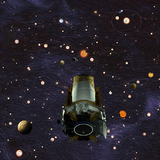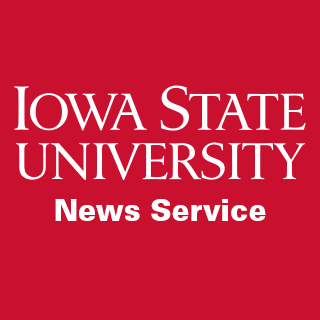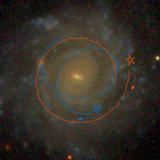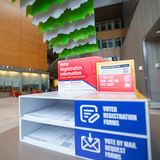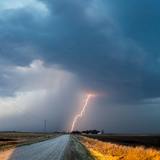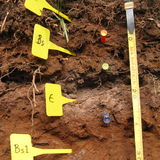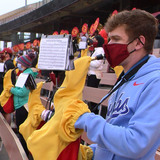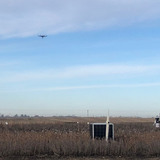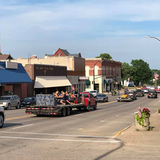News Archive
Tuesday, October 6 2020
-
Iowa State experts available to comment on 2020 election
With the November election just weeks away, Iowa State experts are available to discuss a variety of issues as well as the outlook in the race for president and congressional seats.
-
“The NASA Kepler Mission” book: Planet hunting, star studies and, “Are we alone?”
A new book chronicles the scientific discoveries of NASA's Kepler and K2 missions. It also asks some big questions: "Are we alone? What is our place in the Universe?" Iowa State's Steve Kawaler contributed to the book and is chair of the editorial advisory board for the partnership that published the book.
-
Tropical Cyclone Studies at ISU
As Atlantic hurricanes and tropical storms continue to make landfall, Iowa State's Christina Patricola, who studies tropical cyclones, tells viewers how a new grant from the U.S. Department of Energy's Office of Science Early Career Research Program will help her study global storm numbers and regional storm intensity and rainfall.
-
Astronomers model, determine how disk galaxies evolve so smoothly
By developing better computer simulations, researchers have determined that the scattering of stars from their orbits by the gravity of massive clumps within galaxies leads to a common look in galaxy disks -- bright centers fading away to dark edges.
-
Iowa State names Dorhout as next vice president for research
Peter K. Dorhout has been named vice president for research at Iowa State University. Dorhout, a fellow of the American Association for the Advancement of Science and former president of the American Chemical Society, currently serves as VPR and professor of chemistry at Kansas State University. He will begin his tenure in Ames by Jan. 25, 2021.
-
Iowa State students, Catt Center leading efforts to urge voter registration, voting plan
Iowa State University students and campus leaders are doing everything possible to encourage students to register to vote and to make a voting plan for the November general election, including the creation of voter information stations across campus.
-
COVID-19 weekly snapshot
The following information is a supplement to the university's COVID-19 Public Health Data weekly updates. It is intended to provide a brief snapshot of the data and trends identified by Iowa State's public health team.
-
Heavy rainfall drives a third of nitrogen runoff, according to new study
Extreme rain events that occur on nine days a year drive around a third of all nitrogen yields on farmland in the Mississippi River basin, according to a new study. The research could inform how and when farmers apply nitrogen fertilizer to their fields and has environmental implications for the hypoxic zone in the Gulf of Mexico.
-
Researchers to study effects of landlord decisions during pandemic
A rapid response grant from the National Science Foundation will allow an Iowa State University research team to study how landlord decision-making has contributed to rental housing instability during the COVID-19 pandemic.
-
Iowa State makes changes to spring academic calendar
As part of the ongoing response to the COVID-19 pandemic, Iowa State University’s spring 2021 semester will begin two weeks late and eliminate spring break. In a letter today to the campus community, President Wendy Wintersteen announced that spring classes will begin Jan. 25.
-
U.S. News rankings: Iowa State 54th among public universities
Iowa State University improved in the overall and public university 2021 rankings released Monday by U.S. News and World Report. Iowa State is tied for 54th among public universities and tied for 118th in the overall national rankings.
-
Digging into soil organic matter
A new study found patterns in how soil organic matter forms across a wide range of climate types. Understanding how soils break down or preserve organic matter is important because organic matter plays a central role in the kind of services soils can provide, such as whether they make good agricultural soils or if they can sequester carbon to slow climate change.
-
The beat goes on: Cyclone Marching Band adjusts to pandemic for football opener
Unlike years past, the Cyclone Marching Band will not take the field at Jack Trice on Saturday, Instead, the band will take over the stands on the east side of the stadium to allow for 7.5 feet – or 4 steps in marching band terms – between each band member. Pregame and halftime performances will be from the bleachers. The band has also implemented several other mitigation strategies.
-
President Wintersteen statement on Stephens Auditorium
President Wintersteen says the university and the athletics department are committed to working together to develop a plan for how Stephens Auditorium will operate into the future for the benefit of campus and the Ames community.
-
Connecting farmers to share agronomic data
A new project will help farmers harness innovative technology to pool data in an effort to improve production. The effort, recently funded by a federal grant, will start out as a small pilot project and gradually expand to hundreds of farmers.
-
Study of ‘shrink-smart’ towns expanding to include curriculum, big data
Iowa State's rural smart shrinkage project has received a three-year, $1.5 million grant from the National Science Foundation to build upon its pilot study examining whether there were towns in Iowa that have lost population but perception of quality of life has remained stable or improved.

